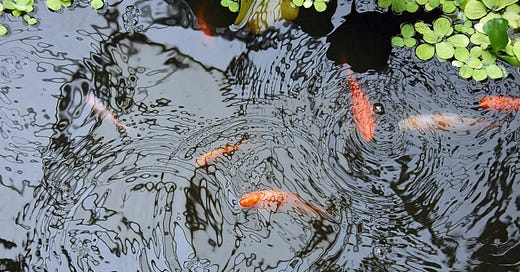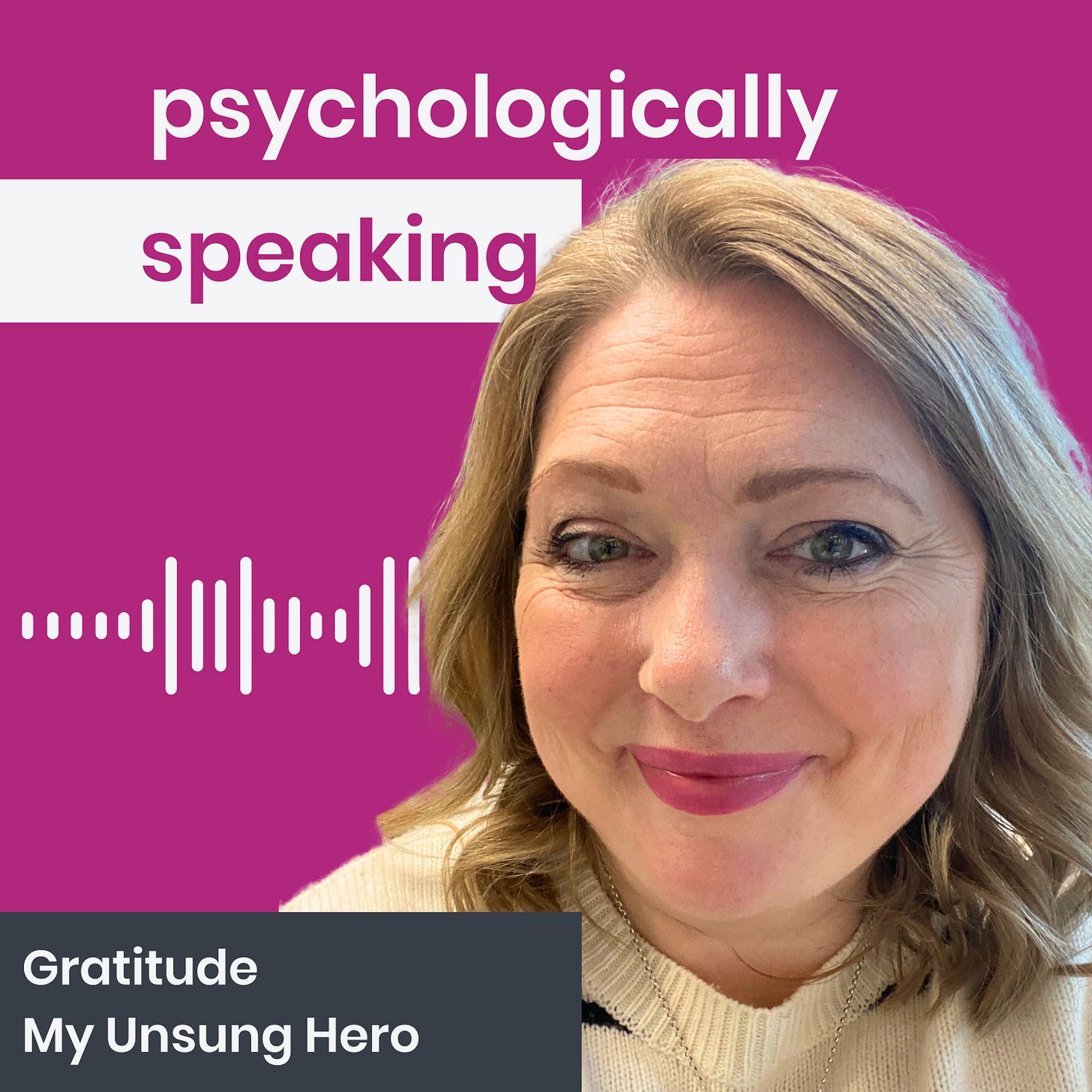This is not an actual image of my pond, although I am the owner of 70 (ish) goldfish. An unexpected moving in gift from the previous house owners, we’ve just about fixed the temperamental garden electrics and the annual census would suggest that we are doing an OK job of looking after them. Big Bad Barry (those of you with toddlers will understand that Ben & Holly reference) perished during the first summer, but I can only think that our fish are quite happy swimming about because we have a stable population, despite the best efforts of the local crane.
Why am I going on about fish and ponds? a biological discovery of age defying cells came from pond critters, and this week I’m linking that up with the gift of gratitude and an antidote of sorts to the effect of Imposter experiences.
I wrote this for my podcast, and you can listen to that here if you prefer (I would love it / express an enormous amount of gratitude/ if you download, listen and rate it if that’s your thing).
For the readers in the digital room, here’s my podcast script, enjoy!
I was talking to someone this week about the challenge of staying positive when we face uncertainty, we can't and shouldn't be positive all the time, in fact defensive pessimism has a particularly useful role to play in preparing us for uncertainty. Thinking forward to potential setbacks is a nifty way to problem solve, thinking through scenarios and ruminating on a problem is good for a while, as long as we avoid negative rumination or worrying.
We are told to be optimistic because it’s good for us, many studies show the health benefits of a positive outlook in life, but it is harder to be positive when uncertainty outweighs the things we think can control. This is just one of the ways in which we experience imposter phenomenon, in Episode 2 we explored the impact that imagined audiences with all their uncertainty has on our behaviour.
So today, we’ll look at one of life’s unsung heroes’, the grounding experience of gratitude, and how it can help us to take the uncertainty that is synonymous with imposter feelings and bring balance to our world view.
But I want to take a detour, and tell you a story about incredible scientists, care giving, pondlife and stress. Elizabeth Blackburn is a molecular biologist; she won a Nobel prize with her colleagues for researching pond organisms that had cells that didn’t die or get old, unlocking the formula for ageing is important work, they discovered that an enzyme called telomerase is responsible for maintaining length of a telomere.
Telomeres are the caps at the end of DNA threads, Elizabeth Blackburn describes these as being like the aglets on the end of our shoelaces, they stop the ends from fraying. Telomeres do the same job for our chromosomes. Imagine a chromosome, you'll have seen this represented as an X image in biology book, think of the chromosome as two threads that cross over each other and these threads are packed full of DNA.
All I want you to remember at this point is that the length of your telomeres, those caps at the end of the chromosome relate to ageing, and those pond organism cells had plenty of an enzyme that maintains telomeres, this is what stopped those cells ageing and dying.
This was a phenomenal discovery, but what happened next changed the way we think about stress, Elizabeth met Elissa Epel, a health psychologist who was researching stress in mothers of children with a chronic condition, as a group these mothers were under what we would call prolonged psychological stress.
Stress is normal, our bodies are uniquely equipped to deal with stressful situations, when we encounter stress a cascade of events kicks into action, very simply, releasing adrenaline and noradrenaline to prepare us for fight or flight, and then 20 or so seconds later a signal goes up to our hypothalamus in the brain to trigger hormones which flood the body with cortisol about 20 minutes after the thing that stressed us, and if everything goes to plan the cortisol travels back to the hypothalamus to stop further production of cortisol and we go back to normal. When we are chronically stressed our production of cortisol is heightened, and we start to see elevated stress level that doesn’t return to baseline, and this is what we might expect to see from a group of people who are subject to prolonged psychological stress.
Elizabeth and Elissa looked at the length of the telomeres of caregiving mothers, but they also asked these mothers about their perceived stress using a questionnaire.
The results show the longer the mother had been caregiving, the shorter her telomeres, suggesting there was a reduction in maintenance of cells which leads to increased cell ageing. And, using the questionnaire data, the more these women perceived their situation as being stressful, the lower they found the enzyme levels for maintaining the telomeres.
Elizabeth and Elissa had biological evidence at a cellular level that the more chronic stress you are under, the shorter your telomeres, essentially these women would age in a quicker way, including disease. But they also observed stress resilience in their study, women who rated themselves as lower in perceived stress had longer telomeres, for these women they experienced or approached the day-to-day caregiving as a challenge rather than a threat.
This lifetime of work by Elizabeth and Elissa provides an understanding of the biological response to perceived stress, it demonstrates that stress can accelerate the ageing process, however it is not the size or intensity of the stress that is the main factor.
So, you might be thinking, Leila that was a lot of biology but what has this got to do with Imposter and gratitude?
Gratitude is known to reduce feelings of stress and anxiety in the long term by reducing cortisol levels and it's also thought that people who express gratitude may have more grey matter, but that's for another time. During my research, I found that women who experienced imposter feelings found online spaces to be risky and exposing. Their response to this threat wasn't a complete retreat from being an entrepreneur or exit from online spaces, instead they found risk averse ways to participate. The reflections of women I spoke to were gratitude based, both towards the hosts of online spaces, and the women who’s behind the scenes experiences they could learn from.
Our research interviews were an opportunity for these women to take a moment to think about their experiences, to be mindful, and their expressions of gratitude feature in the research theme 'coping with comparison' and how, when they used comparison in a helpful way to be curious about other women and their entrepreneurial journey, they were grateful for that behind-the-scenes insight. If you like, these women were taking the chronic experience of imposter and applying a challenge mindset, a ’how do other women navigate this approach?’ which led to feelings of gratitude.
Gratitude is my unsung hero because expressing gratitude with others, even in small ways, is important for feelings of closeness, bonding and interpersonal relations, its low cost, and it reduces our stress levels. Of course, chronic stress isn't just as simple as what we perceive, no amount of growth mindset or challenge thinking is going to takeaway systemic racism, sexism, or poverty - but we do know that control along with predictability can reduce stress responses.
So, what have we found out today?
Cells that are maintained by an enzyme called telomerase live longer, perceived stress has an impact on the amount of this enzyme, and we can practice gratitude to reduce our stress response, which should in theory change your cell biology to keep your DNA intact for longer. What’s not to love about a little formula for anti-ageing!
I particularly wanted to talk about gratitude before the next podcast episode, because I want you to notice how the entrepreneur Helen Hill, my next guest reflects and expresses gratitude around an exposing situation in her conversation with me. I’m not going to spoil the episode, but it’s a great example and a mini masterclass in how easy it is, through a reflective chat and the power of hindsight to find gratitude.
I mention this because negative rumination, those exhausting thoughts we experience with Imposter, can be counter balanced.
And gratitude, as Helen will show us, doesn’t have to be a solo exercise where you note down three things at the end of the day, in fact expressing gratitude towards others is proven to strengthen our relationships, and all you have to do is talk it through, but the truly amazing thing about expressing gratitude is that it leads to a cumulative effect on our overall sense of life satisfaction.
Helen’s Episode no. 6 is scheduled for Monday 19th February, download and follow the podcast to hear about it first.
Links
Read the book about the Telomere effect https://www.elissaepel.com/telomere-effect
Elizabeth Blackburn TedTalk
Episode 4. Dress for you, not the doubt!
Ever feel clothes help you act a certain way? Join me and guest Samantha Harman as we smash clothing rules and explore the hidden influences behind our wardrobe choices. We'll dissect the link between fashion and "imposter phenomenon," drawing inspiration from the relatively new psychological term "Enclothed Cognition".








Leila- I used to own a koi pond and so I can resonate with what you’re saying here. Especially on the demands on tending to something else, or in this case someone else. Thanks for sharing.
If only you could back-date gratitude to reverse the effects of ageing. Interesting to hear about the research on ageing and stress. It all makes sense of course. I am not into making gratitude lists, but talking about gratitude is right up my street.